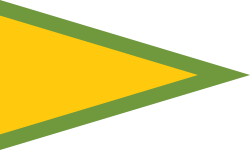Flag Duration Usage Description ?–1863 Alleged flag of Khmer Empire and Cambodia A yellow pennant with green fringe. The claim that this flag existed is dubious and questioned. [ 8] 1863–1940 Flag of the French Protectorate of Cambodia A red field surrounded by a blue band with a depiction of the Royal Palace in white. 1940–1948 Flag of the French Protectorate of Cambodia as well as Kingdom of Kampuchea (1945) A red field surrounded by a blue band with a depiction of the Angkor Wat in white. [ 9] [ failed verification ] 1948–1970 1975–1976
Flag of Cambodia during French Protectorate (1948–1953) and after its independence from France (1953–1970) as well as Kampuchea (1975–1976)
Three horizontal bands of blue, red and blue and a depiction of Angkor Wat in white. [ 9] 1941–1945 Flag of Cambodia under Japanese occupation Red flag with white-outlined square followed by 4 small full white squares in each angle and another in the center. The claim that this flag existed is dubious and questioned. [ 10] 1970–1975 Flag of the Khmer Republic A blue field with a red canton with a depiction of Angkor Wat in white with either black or red outlining and three stars in the upper fly. [ 11] 1975–1990 Flag of Democratic Kampuchea and Coalition Government of Democratic Kampuchea A red field with a simplified depiction of Angkor Wat in yellow. [ 12] Also used by the internationally recognized Coalition Government of Democratic Kampuchea . 1979–1989 Flag of the People's Republic of Kampuchea A red field with a simplified depiction of Angkor Wat in yellow, this time five towers instead of three. [ 13] 1989–1992 Flag of the State of Cambodia Two horizontal bands of red and blue with either the simplified depiction or a new five tower depiction of Angkor Wat in yellow. [ 14] 1992–1993 Flag of United Nations Administered Cambodia A United Nations blue field with a map of Cambodia in white and the Khmer word for Cambodia in blue. [ 15] 1990–present (de jure) (de facto) Flag of the National Government of Cambodia and the Kingdom of Cambodia Three horizontal bands of blue, red and blue and a depiction of Angkor Wat in white with black outlining. [ 1] [ 16] 
















